- About
- Apply
- Awards + Funding
- Graduate Students
- Life + Community
- Faculty + Staff
- Individualized Interdisciplinary Studies in Graduate Studies
Supporting Indigenous Graduate Students
Graduate Studies is located on the ancestral, traditional and unceded territory referred to in Skwxwu7mesh (Squamish) as Lhuḵw’lhuḵw’áyten – (Burnaby Mountain, Burnaby, BC). We respectfully acknowledge the xʷməθkʷəy̓əm (Musqueam), Sḵwx̱wú7mesh Úxwumixw (Squamish), səl̓ilw̓ətaʔɬ (Tsleil-Waututh), q̓íc̓əy̓ (Katzie), kʷikʷəƛ̓əm (Kwikwetlem), Qayqayt, Kwantlen, Semiahmoo and Tsawwassen peoples on whose unceded traditional territories our three campuses reside.
Congratulations on being accepted to graduate school at Simon Fraser University! We look forward to supporting you on your research journey.
In addition to the resources available to all graduate students found under our Awards & Funding, Graduate Students, Community Guide, Professional Development, and News and Events sections of our website, we have collated additional support (including scholarships) available specifically for Indigenous graduate students.
Want to Speak with Someone?
Dorothy Cucw-la7 Christian (Secwepemc & Syilx Nations)
Associate Director, Indigenous Policy & Pedagogy
On leave until April 1, 2026
In Dorothy's absence, please connect with the following people/teams:
Academic Support: Hannah Buteau, Academic Graduate Student
Support. Email: gsupport@sfu.ca
Cultural Support & other student services: Kaylena Ryan, Associate
Director, Indigenous Student Centre: Email: askisc@sfu.ca
Scholarships & Awards: Rachel Dawson or Stephanie Santoso. Email: gradawards@sfu.ca
SAGE: Nicole Manson, Indigenous Academic & Student Liaison in the Faculty of Communication, Art & Technology (FCAT), Email: fcat_indg@sfu.ca
General Graduate Studies (will help to connect you with the right person): gsindig@sfu.ca
Topics you may wish to connect with Dorothy may include:
- overall program,
- supervisory committee,
- funding,
- Indigenizing defense(s),
- Indigenizing writing process,
Indigenous Graduate Community Resources

SFU Indigenous Student Services

Supporting Aboriginal Graduate Enhancement (SAGE)

SFU Office for Indigenous Peoples (OIP)
SFU Indigenous Student Services is a space on Burnaby campus for all current undergraduate and graduate Indigenous students. Their website includes an events page which promotes workshops and cultural activities.
SAGE is a province-wide, inter-institutional, peer-support/faculty-mentoring educational program. The program supports Aboriginal students to make significant educational and social change using research, Indigenous knowledge, and community-oriented approaches.
The OIP was established in 2009 (as the Office for Aboriginal Peoples-OAP) with the mandate to take the lead on implementing the Aboriginal Strategic Plan at Simon Fraser University. Now under the lead of the Indigenous Council Office, the OAP also provides resources such as a directory of Aboriginal Contacts.

First Nations, Métis & Inuit Student Association (FNMISA)

Indigenous Living Learn Community

Third-Party Billing or Sponsorships
The FNSA is an independent student-run organization for all self-identified Aboriginal, First Nations, Inuit, Métis, and Status/Non-Status (FNMI) students here at SFU. Join their email list to learn about upcoming events: fnsa-board@sfu.ca.
Students in the Indigenous Living-Learning Community are able to live across Residence in building types that best fit their academic and personal needs. As a Canadian Indigenous student in this community you will connect with other Indigenous students and build community through peer support, mentorship and leadership development opportunities.
To manage your third-party sponsorships at SFU, please contact Student Accounts through SFU Student Services: student_accounts@sfu.ca

Additional Sources of Funding
You can find additional funding through the following agencies. You must apply with them directly.
- BC Scholarship Society
- Indspire
- BC NEIHR
Indigenous Graduate Awards
Below are two sources of funding through SFU that are specifically for Indigenous graduate students. For all of the awards and funding offered through SFU, please visit our Awards + Funding pages.
Terms of Reference
- Intent: this award is intended to recruit and support incoming Canadian Indigenous students.
- Value and duration: students must be registered full time, regular (not ‘on leave’) to receive payment:
- Award values may vary, between $18,000 - $24,000/yr
- Master’s awards are 2 years, Doctoral awards are 4 years
- Eligibility: candidates must
- be entering a research-based master’s or PhD program
- have Canadian citizenship and Indigenous identity
- Evaluation criteria: generally, awards are based on academic excellence, research potential, and examples of leadership and/or engagement within and outside of academia.
- Restrictions specific to this award:
- Award recipients may hold funding from other sources but should be aware that those other sources may have restrictions on funding.
- There is no restriction on scholarship recipients receiving income for work performed during tenure of the scholarship.
- Funding limits and policies:
- This scholarship is included in SFU's annual maximum support permitted from university administered awards and scholarships.
- All awards are subject to SFU's general graduate funding policies, outlined in the Graduate Student Handbook.
- Application and adjudication: awards are made by the Senate Graduate Awards Adjudication Committee after a University-wide competition in which departmental nominations are considered.
Updated: September 2024 / GUSE006
Terms of Reference
- The purpose of the Indigenous Graduate Travel Award is to provide financial support for Indigenous graduate students for the travel and/or research component of their research. Students can only apply for the Indigenous travel award once per academic year. Indigenous graduate students may apply for this fund before their travel to pay for costs in advance.
- To be eligible for this award, the following criteria must be met:
- This award is for Indigenous graduate students attending Simon Fraser University.
- Indigenous or “Aboriginal” is defined by Canada’s 1982 Constitution as people identified as First Nations, Métis, and Inuit peoples of Canada.
- Disbursements of up to $1000 each may be applied for in each academic year (starting September 1 of each year).
- The funds will be given out on a first come / first applied for basis. The fund will be considered used for the year when the $5,000 limit for the year has been reached. Once the total fund has been distributed for the year, a message will be sent out through the Indigenous graduate student listserv.
- Repeat applications will be allowed from year-to-year. Preference, however, will be given to students who have not yet received money from this fund (this is at the discretion of Graduate Studies).
- Application includes:
- A completed budget which accounts for the requested amount;
- A letter of support from the applicant’s academic supervisor or a faculty member familiar with your work (to verify the student’s academic status, intent, and need).
Travel Report
Upon completion of travel, successful applicants will need to submit the following within two weeks to the Graduate Awards Assistant: gradawards@sfu.ca
A concise Travel and Activity Report, written in language suitable for the general public. Contents and/or quotes from the report may be published in Graduate Studies promotional material. If you do not wish for your travel report to be published, please indicate so.
The following could be included in your report:
- The activities that were carried out, in respect to how the travel contributed to your research and/or scholarly activities
- Any unanticipated benefits derived from the travel, including those in relation to your current research objectives an/or to your general experience as a graduate student
- Any special issues or problems you encountered
| CPA Graduate Award in Indigenous Business and Leadership By Nomination Only | View Approx. Award Value | Business |
| This award valued at a minimum of $5000, will be granted annually in any term to an Indigenous graduate student enrolled in the EMBA in Indigenous Business and Leadership program, and having the intent to pursue a career in accounting. Learn more about this award → |
Terms of Reference
- The purpose of the award is to provide funding to Indigenous graduate students enrolled in the EMBA in Indigenous Business and Leadership Program
- One award, valued at $5,000, will be granted in any term, to graduate students who fulfill the following criteria:
- are enrolled in the EMBA in Indigenous Business and Leadership in the Beedie School of Business;
- are of Indigenous heritage (defined as, in accordance to Canada's 1982 Constitution, First Nations, Métis, and Inuit peoples of Canada); and
- have the intent to pursue a career in accounting.
- This award may be held in conjunction with other awards made by Simon Fraser University or other agencies where permitted by those agencies.
- Applications for the award will be made using the graduate awards system managed by Graduate Studies and must be accompanied by:
- Copies of post-secondary transcripts; and
- One-page letter describing the applicant’s intent to pursue a career in accounting.
- If a suitable candidate is not identified, the award may be disbursed in a subsequent term or year
- The award will be granted by the Dean and Vice-Provost, Graduate Studies on behalf of the Graduate Awards Adjudication Committee, upon the nomination of the Associate Director,Graduate programs or their designate in the Beedie School of Business.
March 2024
Indigenous Graduate Student
-
January 17, 2024
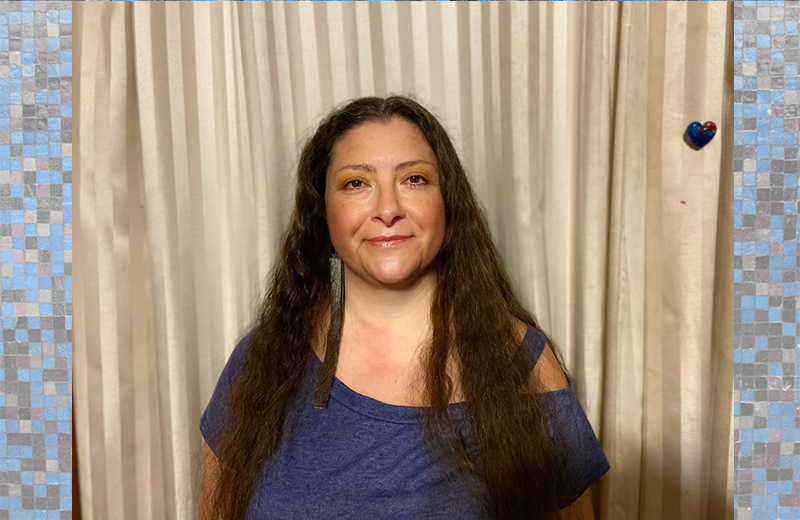
January 17, 2024
Kalaya is a MBA student in the Beedie School of Business, Three research keywords: Holistic, Empowering, Frustrating (CN Graduate Award)
-
January 02, 2024
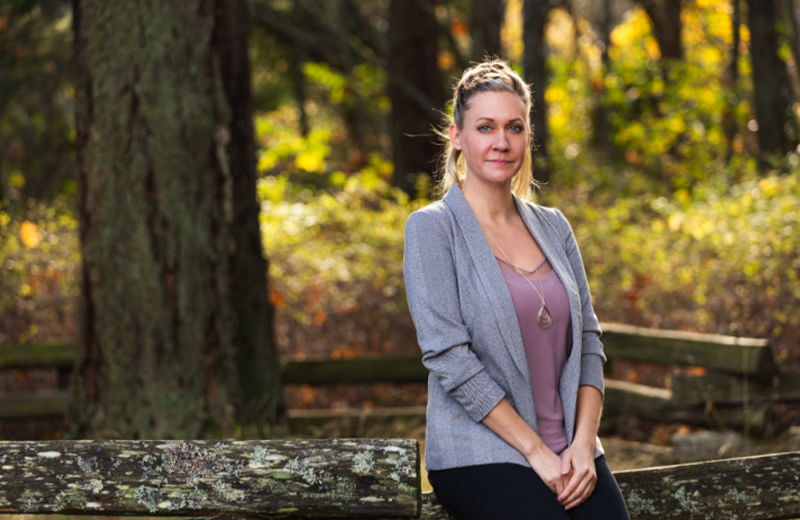
January 02, 2024
Tara is a doctoral student of health sciences and a recipient of the SSHRC scholarship. Three keywords of research: Indigenous research ethics/ethical processes; Indigenous health research; social theory
-
January 18, 2024
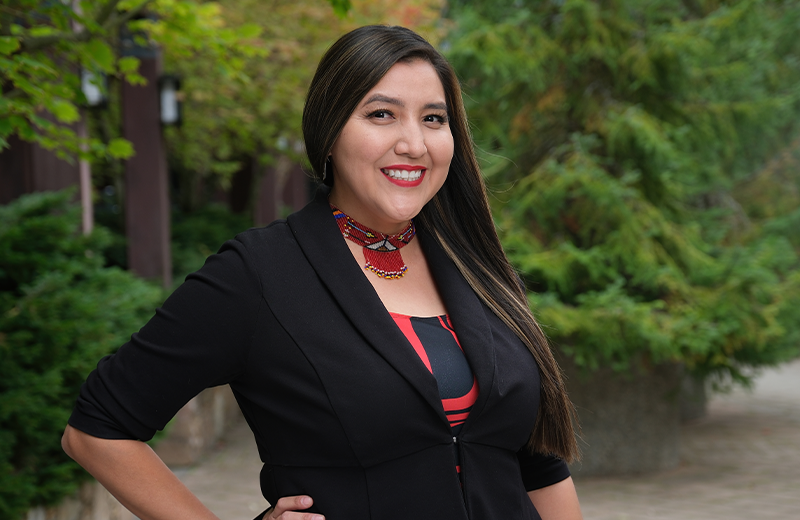
January 18, 2024
Candice is a MBA student in the Beedie School of Business. Three keywords of research: Innovative, Indigenous Resilience. (BMO John Ellis Graduate Scholarship in Indigenous Business and Leadership Annual Award)
Conversations with Indigenous Graduate Students
-
April 12, 2023
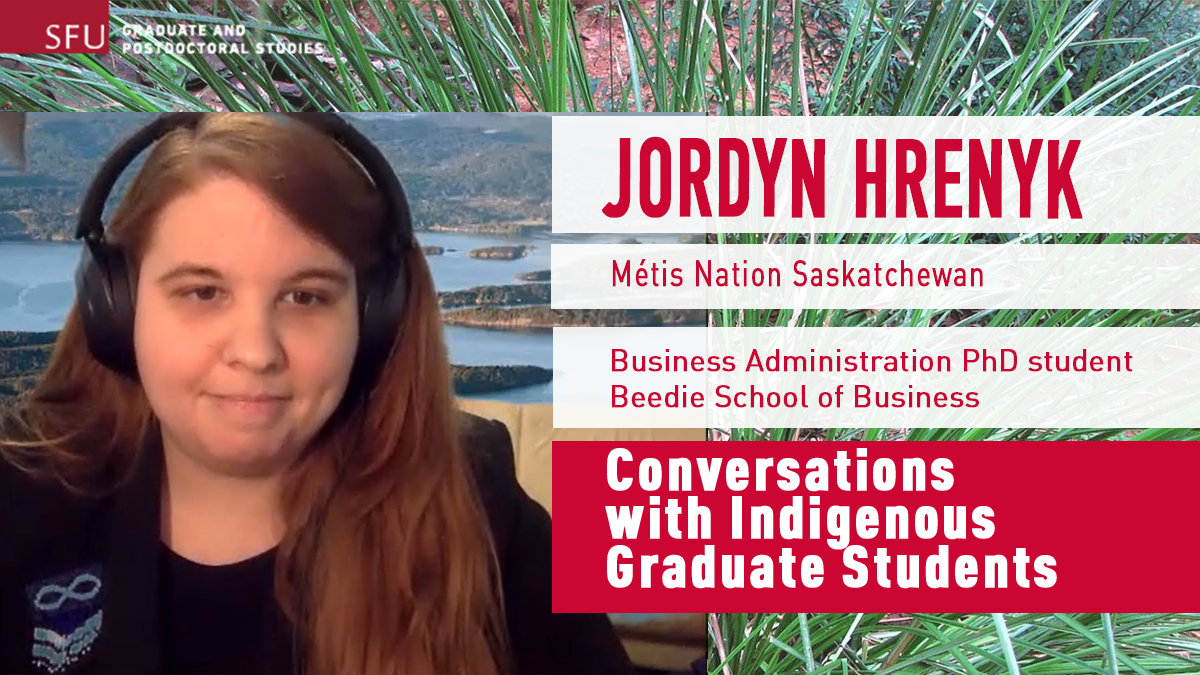
April 12, 2023
Introducing Business Administration PhD student, Jordyn Hrenyk. Watch the video to learn more about Hrenyk's journey, experiences and studies.
-
April 12, 2023
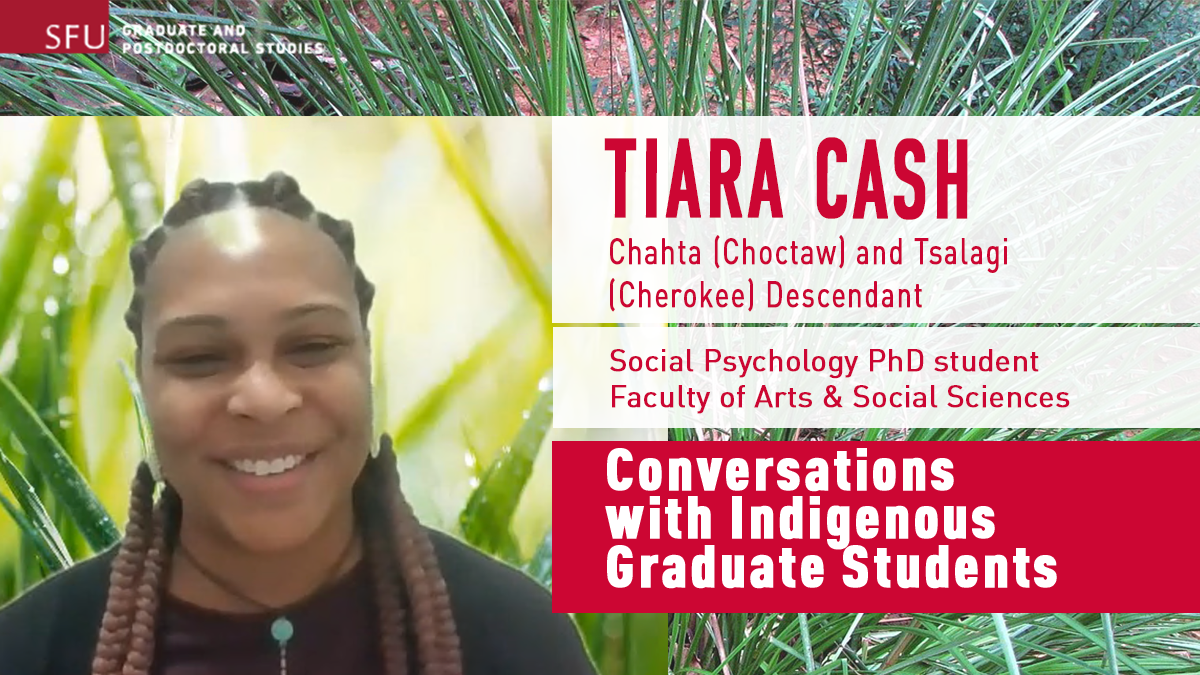
April 12, 2023
Introducing Social Psychology PhD student,Tiara Cash. Watch the video to learn more about Cash's journey, experiences and studies.
-
April 06, 2023
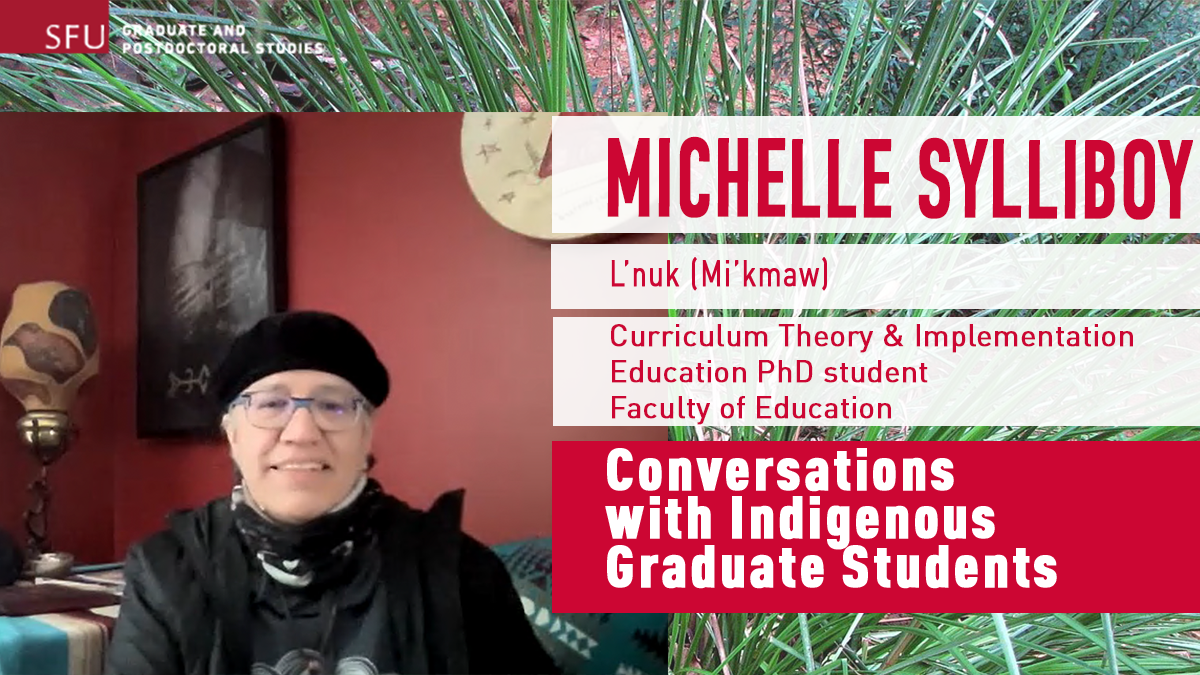
April 06, 2023
Introducing Curriculum Theory & Implementation Education PhD student, Michelle Sylliboy. Watch the video to learn more about Sylliboy's journey, experiences and studies.
-
January 31, 2022
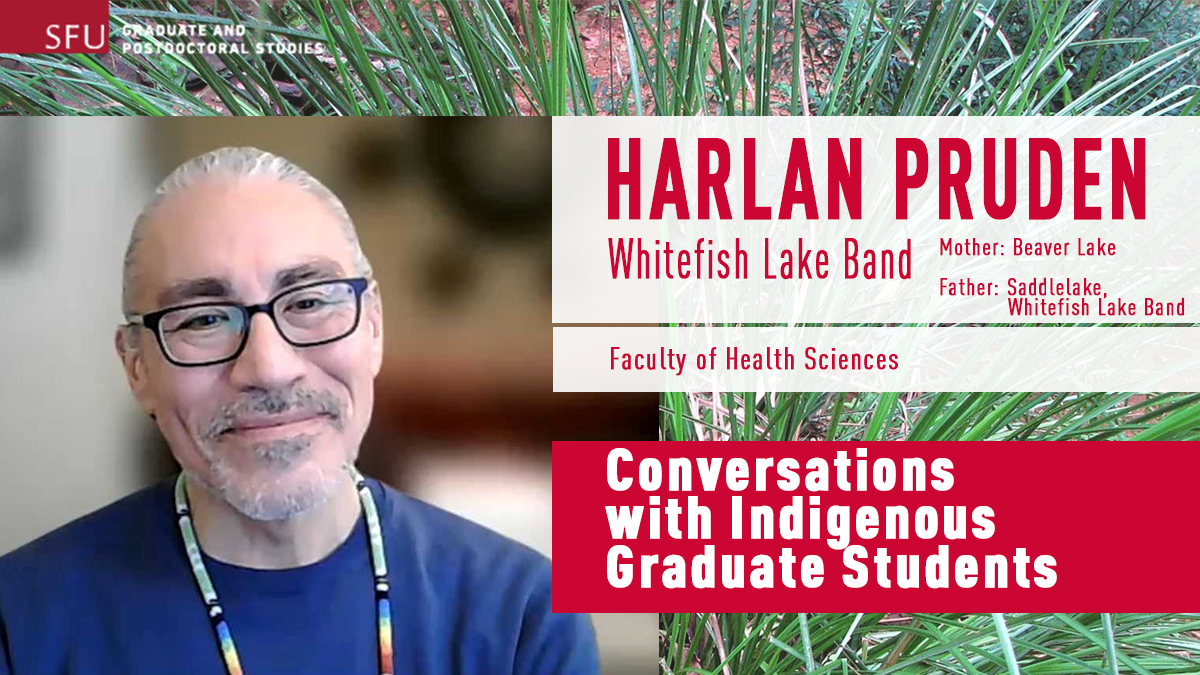
January 31, 2022
Introducing Health Sciences PhD student, Harlan Pruden. Watch the video to learn more about his journey, experiences and research.
-
February 14, 2022
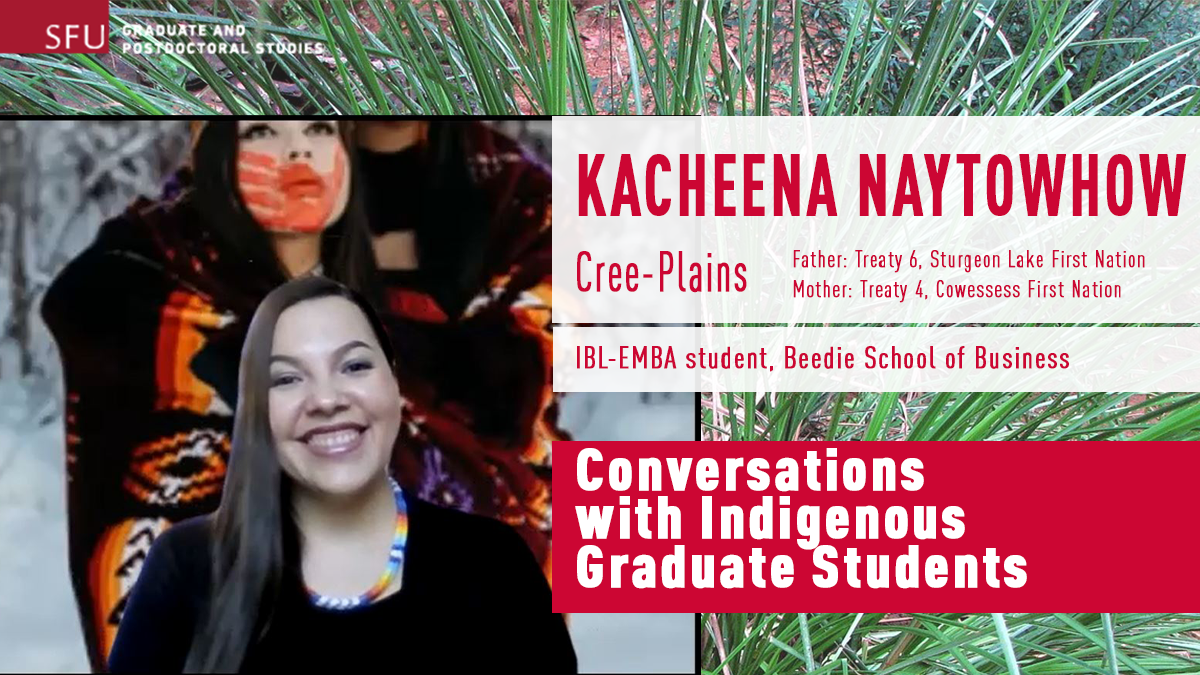
February 14, 2022
Introducing Beedie School of Business IBL-EMBA student, Kacheena Nayhowtow. Watch the video to learn more about her journey, experiences and studies.
-
March 16, 2022
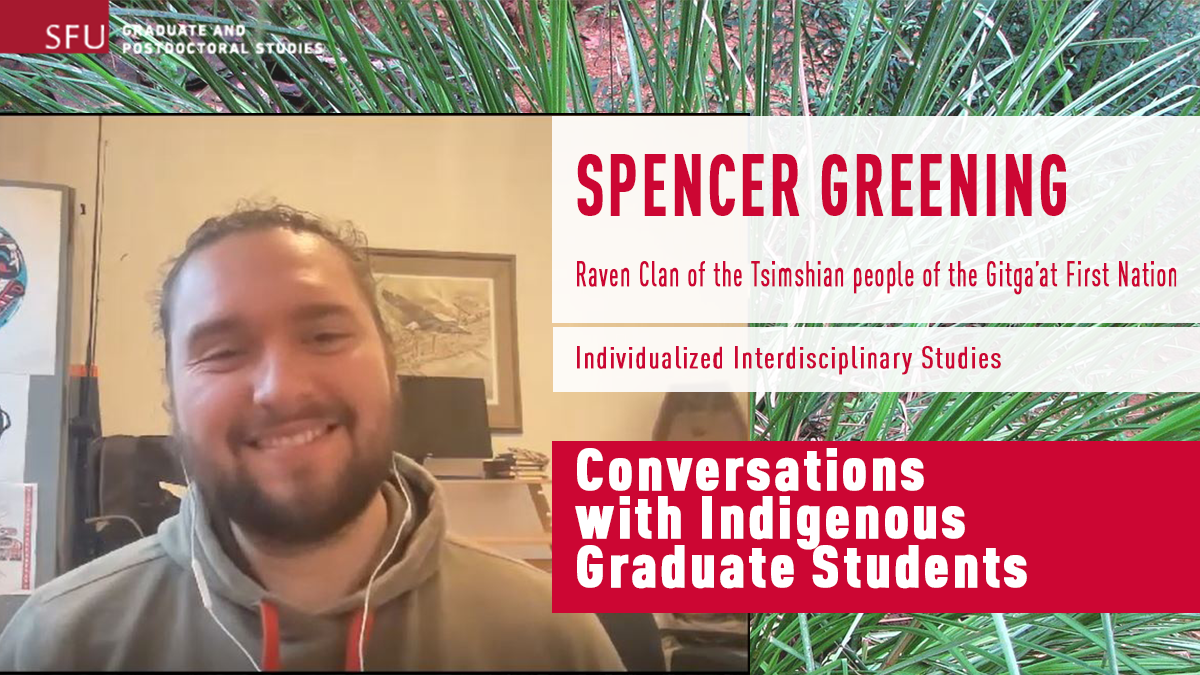
March 16, 2022
Introducing Individualized Interdisciplinary Studies PhD student, Spencer Greening. Watch the video to learn more about his journey, experiences and studies.
Newsletters
- Supporting Aboriginal Graduate Enhancement (SAGE) join the SAGE listserv by emailing the SAGE Indigenous Graduate Peer Mentor: grad.sage@ubc.ca.
- SFU’s Office for Aboriginal People’s Newsletter to learn more about SFU Indigenous-related events, announcements and important dates. Subscribe here.
- Indigenous Top Ten is a free biweekly publication designed to share breaking news, interesting research, best practices, and policy developments regarding First Nations, Métis, and Inuit education in Canada. Subscribe here.
Indigenous Research, Teaching, + Leadership Resources
Indigenous leaders and educators come to SFU to enhance their knowledge and skills in order to benefit their communities. Indigenous students take classes in every Faculty at SFU.
Indigenous Knowledge(s) in the Community with Mike Segwalise Myers
Watch the video recording of this webinar and learn from Mike Segwalise Myers of the of the Seneca Nation during a discussion with Dorothy Cucw-la7 Christian, Associate Director, Indigenous Policy & Pedagogy. Elder/knowledge keeper Mike shares how his Seneca/Haudenosaunee knowledge is at the center of community development projects he is currently involved in within the historical landscape of colonialism.
Indigenous Knowledge(s) + Language in the Academy with Lorna Wanosts’a7 Williams
Watch the video recording of this webinar and learn from Lorna Wanosts’a7 Williams of the Lil’watul Nation of the interior of BC during a discussion with Dorothy Cucw-la7 Christian, Associate Director, Indigenous Policy & Pedagogy. Williams is a highly respected Elder, Knowledge Keeper and Scholar in the international, national, and provincial spheres of influence.
Non-Indigenous SFU Faculty Supporting Indigenous Graduate Students
Watch the video recording of this webinar and learn from the faculty members and Dorothy Christian as they discuss what it means to serve on a committee for Indigenous grad students as a non-Indigenous person.
Indigenous Research Methods in Action: SFU Library Speaker Series
Watch videos of Indigenous SFU researchers discuss how they engage with Indigenous Research Methods in practice. Dorothy Christian is one of the featured speakers. Learn more and watch the discussions

